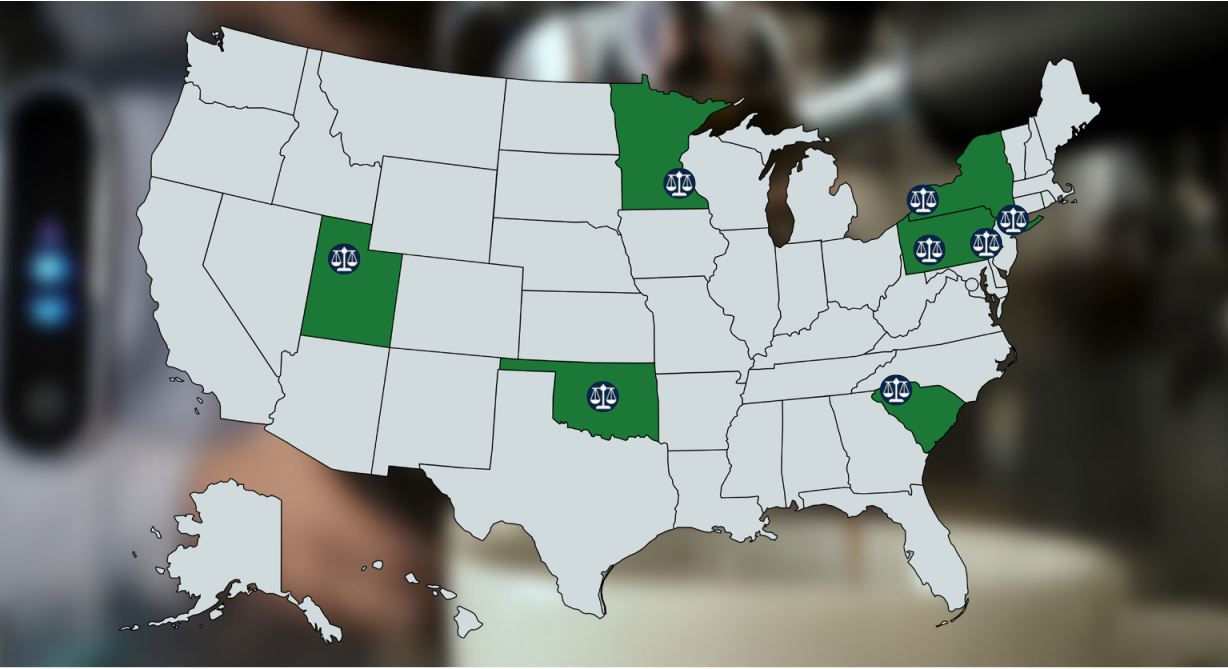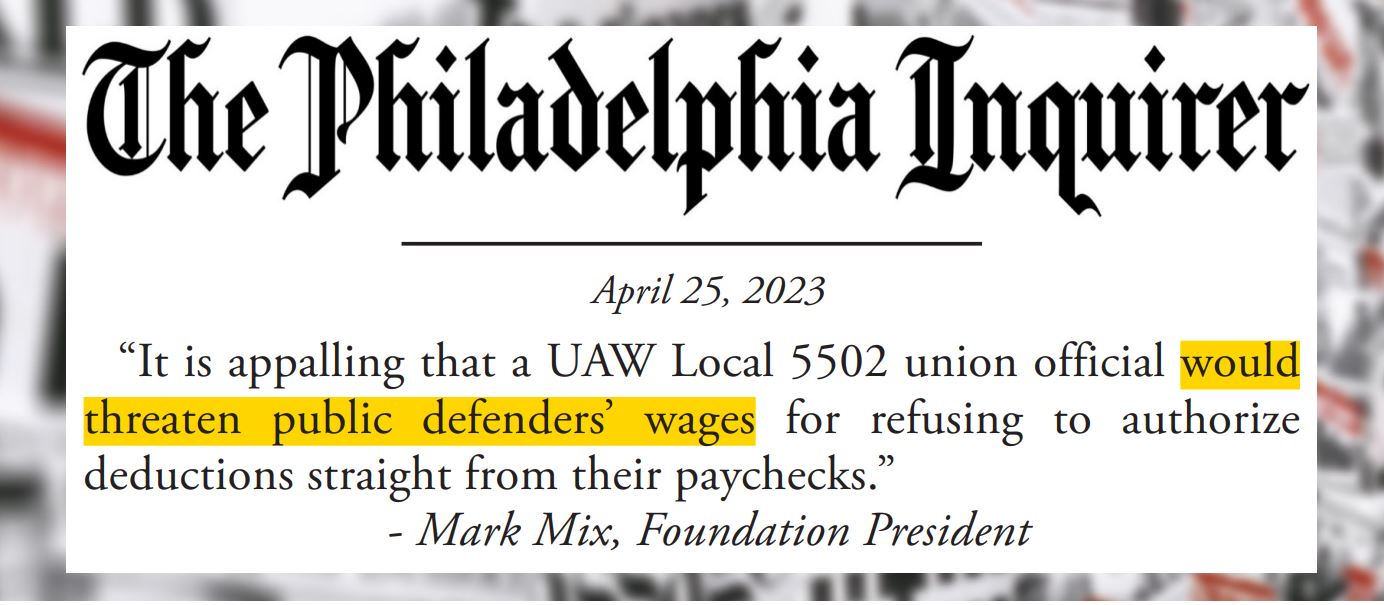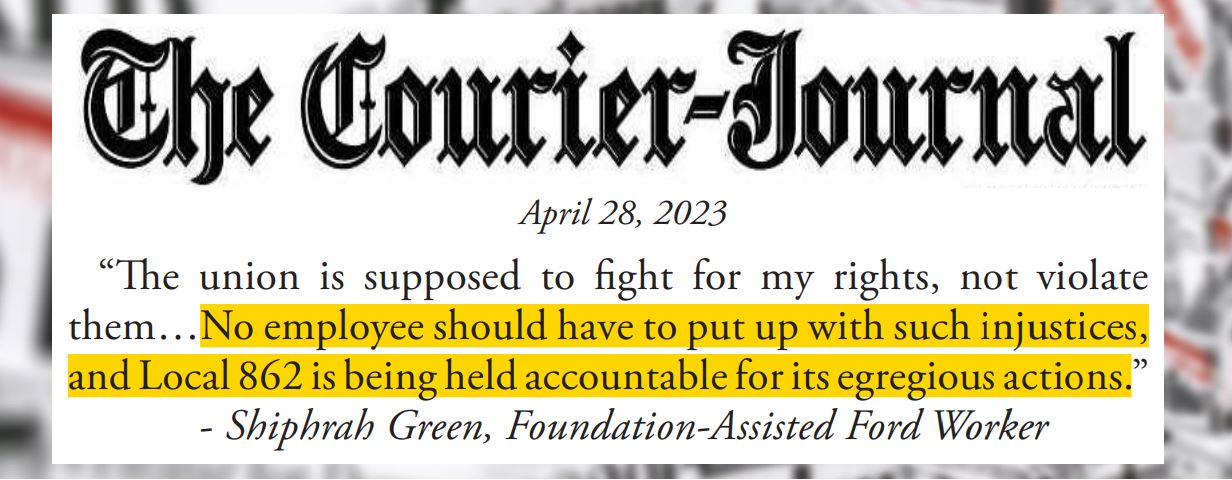MI Kroger Employee Hits UFCW Union, Kroger with Federal Charges for Illegally Requiring Dues Payments, PAC Contributions
Worker contends that union lacks valid contract and thus can’t demand any money from workers, despite recent MI Right to Work repeal
Detroit, MI (April 16, 2024) – An employee of Kroger’s supermarket in the Prospect Hill Shopping Center in Milford, MI, has just hit United Food and Commercial Workers (UFCW) Local 876 union officials and Kroger management with federal charges. The employee, Roger Cornett, charges that Kroger declared it would fire him unless he signed a union membership form, and authorized union dues deductions and contributions to the union’s Political Action Committee (PAC) from his paycheck. Cornett notably points out that UFCW lacks a legal basis to demand money from any worker.
Cornett’s charges are now pending with the National Labor Relations Board (NLRB), the federal agency responsible for governing private sector labor relations. Cornett’s charge recounts that, despite his requesting a copy, neither union officials nor Kroger produced a copy of a union contract containing a so-called “union security clause,” more accurately called a “forced-dues clause.”
Under longstanding federal law, even in a state without Right to Work protections, union officials can only enforce a contract requiring employees to pay dues as a condition of employment if the contract contains a forced-dues clause. To be valid, federal law requires that such clauses have a 30-day grace period before union bosses’ “pay-up-or-be-fired” demands can be enforced.
Since Kroger and UFCW cannot produce a contract that contains such a clause, union demands for dues money should be illegal. This is true notwithstanding Michigan’s repeal of its Right to Work law, a provision that made union membership and union financial support strictly voluntary.
Under federal law, no employee can be required to authorize payroll deductions of union dues or to pay money to a union PAC used to fund union boss-backed political candidates. Additionally, the National Labor Relations Act (NLRA) and U.S. Supreme Court cases like General Motors v. NLRB safeguard the right of workers to abstain from formal union membership, while the Foundation-won CWA v. Beck Supreme Court decision forbids union officials from forcing nonmember workers to pay money for any expenses outside the union’s core bargaining functions, which includes political expenses.
UFCW Union Unleashed Pressure Campaign on Nonmember Workers After Right to Work Repeal
Michigan’s Right to Work law, which prevented union officials from having workers fired for refusing to join or pay dues to a union, was officially repealed on February 13, 2024. According to Cornett’s charges, in February he asked if there was an updated version of the union contract that would require him and other nonmembers to pay dues as a condition of employment in light of the repeal. Neither UFCW nor Kroger provided Cornett with such a contract in response to his request.
Union officials threatened Cornett and other workers that it was a condition of employment for them to become union members, authorize direct deductions of union dues from their pay, and “sign all or part of the three-part Union membership application and checkoff form,” the latter of which included a page authorizing deductions for the union’s PAC.
Worker Faced Termination After Being Threatened to Contribute to Union PAC
Cornett’s charges state that he received a letter from management on February 28 “informing him that…Kroger terminated [him] for failure to become a member of the Union.” This termination took place within the statutorily-required 30-day grace period before forced-dues contracts can be enforced against union nonmembers – meaning the firing would be illegal even if the union had a valid contract that allowed it to require dues payments as a condition of employment.
Cornett says in his charges that he signed the three-part form in order to keep his job. His charges state that the union’s threats and pressuring of employees “violate the [NLRA], and threaten, restrain, and discriminate against Charging Party and similarly situated employees in the exercise of their Section 7 right to refrain from [union activity].”
“Here we have yet another example of union bosses browbeating the very Michigan workers they claim to ‘represent’ as soon as Right to Work protections are gone,” commented National Right to Work Foundation President Mark Mix. “Security guards at government buildings across Western Michigan are already banding together to oppose forced-dues demands from UGSOA union officials, and we now see UFCW union officials trying to squeeze dues money out of Kroger employees using coercive tactics that are forbidden even in a non-Right to Work environment.
“Especially concerning is Cornett’s charge that he was forced to sign his money away for the union’s PAC, a demand that blatantly violates several federal laws while paying no regard for workers’ free choice,” continued Mix. “Foundation staff attorneys will get to the bottom of this and defend Mr. Cornett’s rights.”
Mall of America Starbucks Employees Join Rising Movement Seeking to Remove SBWU Union
Starbucks partners at Minneapolis location join the growing list of workers looking to decertify Starbucks “Workers United” union
Minneapolis, MN (July 14, 2023) – Rebecca Person, an employee of the first floor Mall of America Starbucks location outside Minneapolis, MN, has just submitted a petition to the National Labor Relations Board (NLRB) Region 18 that seek a vote to remove Starbucks Workers’ United (SBWU) union officials from their workplace. The Mall of America Starbucks is just the latest in a growing list of Starbucks locations where employees are seeking to oust union officials. Workers from locations in Manhattan, Pittsburgh, and Buffalo are also receiving free legal aid from National Right to Work Foundation staff attorneys in union decertification efforts.
The union decertification petition contains signatures from a majority of workers at the Mall of America location. The majority support for removing the union is far more than the 30% requirement by the National Labor Relations Act (NLRA) needed to trigger the NLRB to hold a decertification vote among the workers.
With the workers’ petition filed with the NLRB, the NLRB’s rules dictate that a secret ballot election should be promptly scheduled to determine whether a majority of workers want to end union officials’ power to impose a contract, including forced dues, on the workers. Because Minnesota lacks Right to Work protections for its private sector workers, SBWU union officials have the power to enter into an agreement with Starbucks that would require Person and her coworkers to pay union dues or fees as a condition of keeping their jobs. Meanwhile, in Right to Work states, union membership and financial support are strictly voluntary.
Starbucks Workers Increasingly Seek to Vote out SBWU Union Officials
The Mall of America Starbucks workers are just the latest example of Starbucks workers seeking to exercise their right to vote out unwanted union officials. Foundation attorneys are currently assisting Starbucks employees in Manhattan, Buffalo, and Pittsburgh, in obtaining union decertification votes.
As with the New York and Pennsylvania locations, the SBWU union only came to power at the Mall of America Starbucks a little over a year ago – meaning workers began attempts to vote out SBWU nearly as soon as legally allowed. Federal labor law prevents workers from exercising their right to remove an unpopular union at least one year after installed.
A contributing factor to the growing worker dissatisfaction with SBWU union officials may be the controversial practice of “salting,” which involves union officials surreptitiously paying union agents to obtain jobs at non-union workplaces to agitate for union control. “Salts” generally hide their union-allied status from both managers and their coworkers, and may quickly depart the workplace once a union has been installed. The New York Post reported that one SBWU union agent was paid nearly $50,000 to “salt” a Buffalo Starbucks location, and concealed her affiliation from both her coworkers and Congress.
The push for decertification votes at Starbucks is part of a growing trend, with the NLRB’s data showing a unionized private sector worker is far more likely to be involved in a decertification effort as their nonunion counterpart is to be involved in a unionization campaign. NLRB statistics also show a 20% increase in decertification petitions last year versus 2021. However, union officials still have many ways to manipulate federal labor law to prevent workers from voting them out, including by filing unrelated or unverified charges against management.
“The deceptive tactics SBWU officials took in gaining control of multiple Starbucks locations are finally coming back to haunt them,” commented National Right to Work Foundation President Mark Mix. “Starbucks partners nationwide are seeing how the union organizers, including those secretly paid by the union pretending to be genuine coworkers, manipulated them to do what is best for union bosses but not in the best interests of rank-and-file workers.”
“These Starbucks workers have joined others in taking the first step in exercising their rights to oust an unwanted union, and we call on SBWU union officials and the NLRB to respect the wishes of these workers who simply want a prompt decertification vote,” continued Mix. “The right of workers to oust a union that lacks majority support should not be subjugated to the interests of incumbent union bosses seeking to retain power against the wishes of rank-and-file workers.”













